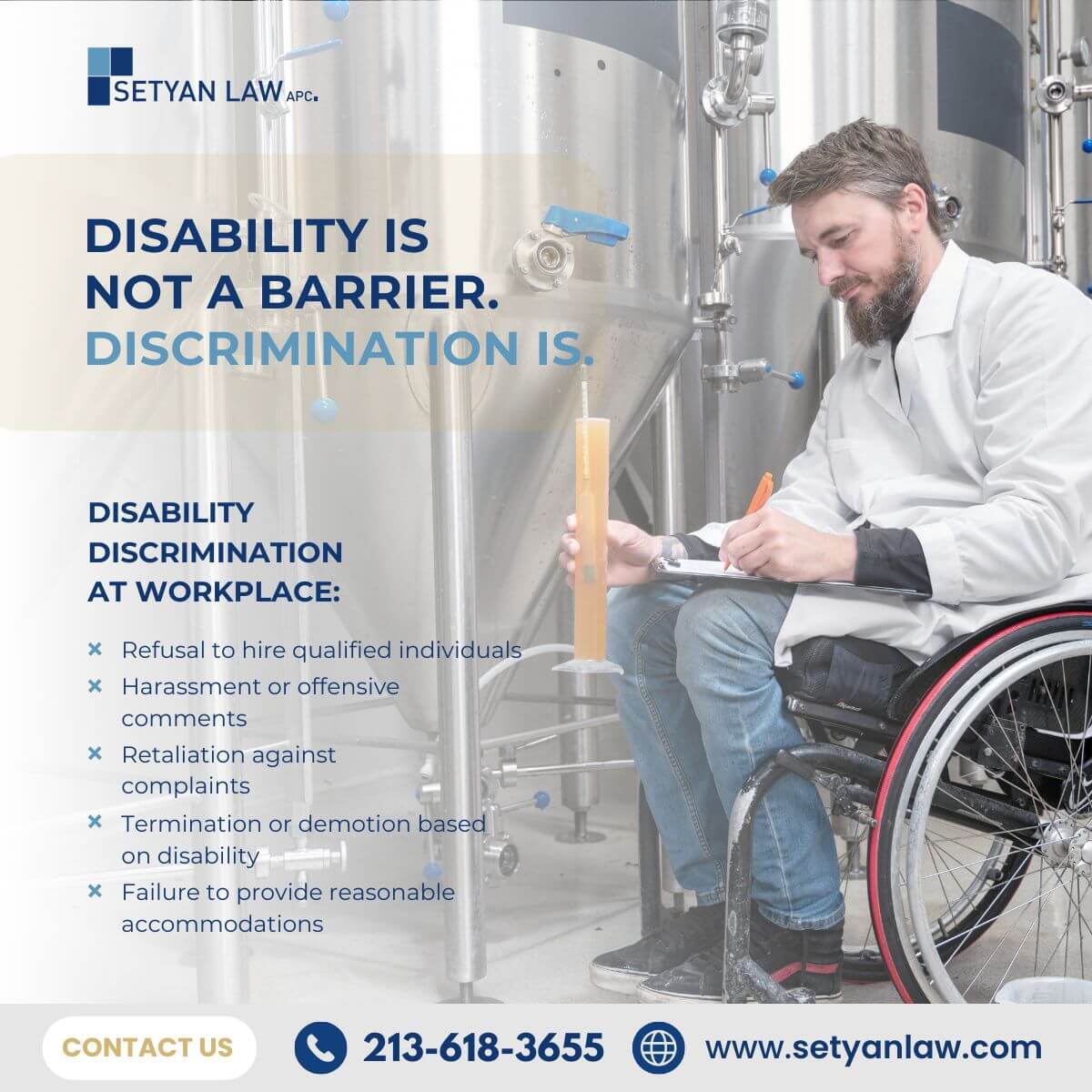Updated February 28, 2024
What’s My Disability Case Worth?
Workplace discrimination based on disability is a serious violation of employees’ rights. In California, the Fair Employment and Housing Act (FEHA) provides protection for workers with disabilities, requiring employers to provide reasonable accommodations unless it imposes an undue hardship. When employers fail to adhere to these regulations, employees have the right to seek justice and compensation through disability discrimination lawsuits.
In this comprehensive guide, we will explore the factors that influence the value of disability discrimination settlements in California. We will delve into the different types of damages that victims may be entitled to, the process of proving disability discrimination, and the importance of legal representation. By the end of this article, you will have a better understanding of the potential worth of a disability discrimination lawsuit and the steps to take to seek justice.
Factors That Influence Settlement Amounts
The value of a disability discrimination settlement can vary widely depending on several factors. These factors include the complexity of the case, the extent of the discrimination, the impact on the victim’s career and earnings, and the evidence presented. Let’s explore some of the key factors that influence settlement amounts:
Complexity of the Case
The complexity of a disability discrimination case plays a significant role in determining the settlement amount. Minor cases, where the discrimination is less severe and straightforward, may result in settlements ranging from approximately $25,000 to $100,000. Moderate cases, which involve more substantial discrimination, can settle for approximately $100,000 to $500,000. High-complexity cases, where the discrimination is severe and pervasive, can result in settlements of $500,000 or more.
Impact on Career and Earnings
The financial and career impact of the discrimination experienced by the victim is another crucial factor in determining settlement amounts. This includes lost wages, benefits, and future earning potential. The more substantial the impact on the victim’s career and earnings, the higher the potential settlement amount.
Documentation and Evidence
Thorough documentation and strong evidence of the discrimination are essential in building a compelling case. Victims should gather records of incidents, correspondence, and medical documentation that support their claims. The more comprehensive and convincing the evidence, the stronger the case and the potential for a higher settlement amount.
Reasonable Accommodation Requests
If the victim has requested reasonable accommodations for their disability, and the employer has denied or failed to provide them, it can significantly impact the settlement amount. Employers have a legal obligation to engage in a good-faith interactive process to find reasonable accommodations. The failure to fulfill this obligation can result in higher settlement amounts.
Adverse Employment Actions
Adverse employment actions, such as demotion, termination, or denial of promotions, resulting from disability discrimination, are crucial factors in determining settlement amounts. These actions demonstrate the severity of the discrimination and can lead to higher settlement offers.
Witness Testimonies
Witness testimonies from colleagues who can corroborate the victim’s claims can strengthen the case and influence settlement amounts. Their willingness to testify and provide supporting evidence can be instrumental in achieving a favorable settlement.
Retaliation
If the victim faced retaliation for filing a complaint or lawsuit related to disability discrimination, it is an important factor that may result in additional claims and higher settlement amounts. Retaliation is often linked to the original discrimination claim and can significantly impact the overall value of the settlement.
Types of Compensation Available for Victims
Disability discrimination victims may be entitled to various types of compensation in their lawsuits. These compensatory measures aim to address the financial, emotional, and punitive aspects of the discrimination experienced. Let’s explore the different types of compensation available:
Economic Damages
Economic damages cover tangible financial losses resulting from the discrimination. This includes lost wages, benefits, and medical expenses. Victims may be awarded compensation for the actual financial impact they have suffered due to the discrimination.
Non-Economic Damages
Non-economic damages encompass intangible losses such as emotional distress, pain and suffering, and loss of enjoyment of life. These damages aim to compensate victims for the psychological and emotional toll of the discrimination.
Punitive Damages
In cases of particularly egregious discrimination, punitive damages may be awarded to punish the responsible party and deter future misconduct. Punitive damages go beyond compensating the victim and serve as a form of punishment for the employer’s actions.
Attorney’s Fees and Legal Costs
Victims may be entitled to compensation for attorney’s fees and legal costs incurred while pursuing their discrimination case. This provision ensures that victims are not burdened with excessive legal expenses when seeking justice.
Critical Step: Proving Disability Discrimination
Proving disability discrimination in the workplace requires demonstrating that adverse employment action was taken based on the individual’s disability. To establish a strong case, victims should consider the following elements:
Document the Disability
Victims should document their disability by gathering medical records, diagnoses, or treatment histories. This documentation serves as evidence of the existence of a disability.
Discriminatory Action
Identify the specific discriminatory action taken against you, such as termination, demotion, or denial of reasonable accommodations. This is the primary issue to address in the case.
Timing and Correlation
Establish a connection between the adverse action and your disability. Timing can be critical; if the adverse action closely follows your disclosure of the disability or a request for accommodation, it can indicate discrimination.
Consistent Treatment
Demonstrate that you were treated differently from non-disabled employees in similar situations. Consistency in how the employer treats employees is essential in establishing discrimination.
Request for Accommodation
If you requested reasonable accommodations, ensure there is documentation of the request and any response from your employer. This shows that you have actively sought a solution for your disability.
Witness Testimonies
Gather witness testimonies from colleagues who can attest to the discriminatory behavior or any comments related to your disability. Their statements can strengthen your case and support your claims.
Employer’s Response
Document how your employer responded to your complaint or concerns about discrimination. Their actions, or lack thereof, can be telling and serve as evidence in your case.
Legal Consultation
Seek legal advice from an experienced employment discrimination attorney who can guide you through the legal requirements, gather evidence, and build a strong case. Legal representation is crucial in navigating the complexities of disability discrimination lawsuits.
When You Have a Valid Claim
Certain indicators suggest the presence of a potential disability discrimination claim. These indicators include adverse employment actions, differential treatment compared to non-disabled colleagues, requests for accommodation, harassment or a hostile work environment, and retaliation for filing a complaint. If you experience any of these situations, it is crucial to consult an attorney to assess the viability of your claim.
However, it is also important to recognize indicators that may suggest a lack of a valid claim. If there is no concrete evidence or specific instances of discriminatory treatment, if the adverse action is clearly unrelated to disability, or if there is no legally recognized disability, the claim may lack validity.
Hiring a Lawyer for a Disability Discrimination Lawsuit
Hiring an experienced employment attorney is crucial for those seeking justice and fair compensation in disability discrimination cases. An attorney specializing in employment law can provide invaluable guidance throughout the legal process, ensuring that your rights are protected and that you receive the maximum compensation possible. They will help gather evidence, negotiate with employers, and represent your interests in settlement negotiations or trial.
Disability discrimination in the workplace is a violation of an individual’s rights and can have significant personal and professional consequences. Understanding the potential worth of a disability discrimination lawsuit is essential for victims seeking justice. Settlement amounts are influenced by various factors, including the complexity of the case, the impact on the victim’s career and earnings, and the evidence presented.
Compensation for disability discrimination can take various forms, including economic damages, non-economic damages, punitive damages, and attorney’s fees. Proving disability discrimination requires documenting the disability, establishing a connection between the adverse action and the disability, and gathering witness testimonies.
If you believe you have a valid disability discrimination claim, it is crucial to seek legal representation from an experienced employment attorney. They will guide you through the legal process, advocate for your rights, and help you secure the compensation you deserve. With their support, you can navigate the complex landscape of disability discrimination lawsuits and work towards a fair resolution
If you need disability rights litigation, please call Setyan Law at (213)-618-3655. Free consultation.






